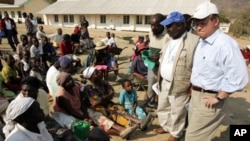Disagreement is common in Zimbabwe’s three-year-old power-sharing government.
And the parties in the coalition are once again at odds -- this time over the status of non-governmental organizations and whether they can or cannot operate in the country.
The outcome of the debate is important, as millions of Zimbabweans depend on such groups for safe water, food and even clothing.
Zimbabwe’s social welfare sector, once the envy of many developing nations, has crumbled over the past decade as government funds and services increasingly fail to meet people's needs.
“That is a bad statistic," said Henry Madzorera, Zimbabwe's health minister. "We have deteriorated over the last 10 to 15 years. We have to do a lot of hard work. If you want to call it desperate, it is really desperate,” he said.
Madzorera has recently acknowledged the country's maternal mortality rate is on the rise.
According to United Nations figures, about eight women die in childbirth each day in Zimbabwe, or about 725 women for every 100,000 live births. Most of them occur at home as the $25 delivery fee charged at hospitals is out of reach for most women.
Unfortunately, many Zimbabweans face similar desperate situations regarding food, clean water, and other basic needs. As a result, millions of people have turned to non-governmental organizations, commonly called NGOs.
But these NGOs are now in a quandary after Masvingo province Resident Minister Titus Maluleke issued a statement saying they need to register if they want to continue operating. Cephas Zinhumwe, head of NANGO, a grouping of NGOs operating in Zimbabwe, is worried about the effects of the ban.
"The government has already announced that there is going to be a serious famine and Masvingo is going to be one of the places to be affected," he said. "If all our members are stopped to deliver food, there is going to be chaos. People are going to die. Hence the reason NANGO has gone to appeal to the government to stop that, so that we only focus on that problem of hunger we are facing instead of fighting on our own," Zinhumwe said.
Repeated phone calls to Minister Maluleke for comment went unanswered.
But Labor and Social Welfare Minister Paurina Mpariwa, who is responsible for registration of NGOs, dismissed the ban imposed by his colleague.
"I have not pronounced or banned any particular NGO," Mpariwa said. "That is a non-event because I believe this is the time we need NGOs most because of our problems. Specifically Masvingo is faced with a number of challenges including water and sanitation. Food, for example, that is the worst-hit province, including Mat North Mat Sound and Bulawayo and other provinces that need food from NGOs that we allocate provinces to work in."
Despite Mpariwa's reassurance, Zimhumwe and the leaders of NGO are concerned about political trends in Zimbabwe.
At the conference of President Robert Mugabe’s ZANU-PF party in December, the party resolved that NGOs must be banned in Zimbabwe, deciding they are interfering with internal politics.
"We are going to have the constitution rolled out this year and we are going to have the elections this year," said Zinhumwe. "How are we going to have civic education if our members are not allowed to get into the villages? How are we going to make sure people understand what is written in the constitution? ... For us, we say open up the doors so that our members can start to work," he said.
One thing seems clear: a large number of Zimbabweans are benefiting from the work of the NGOs.
Patients at Murambinda Mission Hospital, more than 200 kilometers southeast of the capital, Harare, stand in line to get treatment. A French NGO, Doctors Without Borders, has an almost eight-year-old HIV/AIDS project at the hospital.But this project and others might become history if NGOs are totally banned in Zimbabwe.
Social Welfare Minister Mpariwa, an appointee of Prime Minister Morgan Tsvangirai, believes ZANU-PF's effort to ban NGOs will backfire on the party.
"Come election time, we'll use the sentiments for Maluleke to say they are separating the mouths of people between food and what actually [we're] giving them: sand in their mouths," said Mpariwa.
Until elections are held, whenever that may be, the status of NGOs in Zimbabwe remains uncertain.







